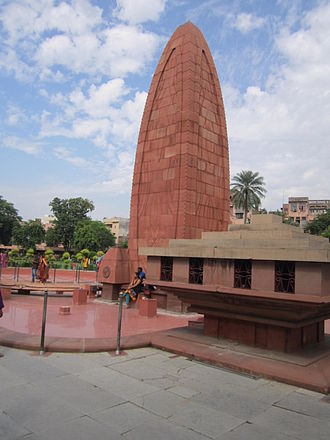Jallianwala Bagh

Jallianwala Bagh (Hindi: जलियांवाला बाग) is a public garden in Amritsar city in Punjab and houses a memorial of national importance, established in 1951 by the Government of India, to commemorate the massacre of peaceful celebrators including unarmed women and children, by British occupying forces, on the occasion of the Punjabi New Year on April 13, 1919. This event is remembered as Jallianwala Bagh Massacre. Colonial British Raj sources identified 379 fatalities and estimated about 1100 wounded. Civil Surgeon Dr. Smith indicated that there were 1,526 casualties. The true figures of fatalities are unknown, but are likely to be many times higher than the official figure of 379.
The 6.5-acre (26,000 sq. metres) garden site of the massacre is located in the vicinity of Golden Temple complex, the holiest shrine of Sikhism.
The memorial is managed by the Jallianwala Bagh National Memorial Trust, which was established as per the Jallianwala Bagh National Memorial Act passed by the Government of India in 1951.
The place derives its name from that of the owners of this piece of land in Sikh times. It was then the property of the family of Sardar Himmat Singh (d.1829), a noble in the court of Maharaja Ranjit Singh (1780-1839), who originally came from the village of Jalla, now in Fatehgarh Sahib district of Punjab. The family were collectively known as Jallhevale or simply Jallhe or Jalle, although their principal seat later became Alavarpur in Jalandhar district.
जलियांवाला बाग का हत्याकांड - 13 April 1919 को बैसाखी के दिन अमृतसर में बड़ी भारी सभा हुई। उस समय पंजाब के गवर्नर सर माइकेल ओडायर थे। उन्होंने अमृतसर शहर जनरल डायर के हवाले कर दिया। जनरल डायर ने इस सभा को गैर कानूनी घोषित कर दिया। हजारों लोग जलियांवाला बाग में एकत्रित हुए। इस सभा में गांधी जी व डा० सत्यपाल की रिहाई की मांग हो रही थी।
इसमें रौलेट एक्ट का भी विरोध किया जा रहा था। जनरल ई० एच० डायर ने सभा के 20,000 लोगों को तितर-बितर होने के लिए कहा। आदेश के दो मिनट बाद (जब तक लोग निकलना आरम्भ भी न कर पाए) गोली चलाने का आदेश दे दिया। जनरल डायर के 50 अंग्रेज तथा 25 गोरखा व 25 बलोची सैनिकों ने 1650 गोलियां जनता की भीड़ पर चलाईं। बाग से बाहर निकलने का केवल एक ही रास्ता था, उसी पर मशीनगन से फायर खुलवा दिया। इन गोलियों से 400 भारतीय नागरिक मारे गये और 2000 घायल हो गए। समस्त पंजाब में मार्शल लॉ लागू कर दिया गया हजारों लोगों पर अभियोग चलाये गये। जनता पर असहनीय अत्याचार ढाये गये। अमृतसर में दिन भर लोगों को तपती धूप में खड़ा रखा जाता था। यहां की एक गली में प्रत्येक आने-जाने वाले को पेट के बल रेंग कर पार जाना पड़ता था। लोगों के नंगे शरीर पर कोड़ों की बौछार की जाती थी।
इस जलियांवाला बाग हत्याकांड तथा अन्य अत्याचारों के कारण देश में रोष की लहर दौड़ गई। इससे भारतीयों का हृदय कांप गया। इस अत्याचार के विरुद्ध अपना रोष प्रकट करते हुए रवीन्द्रनाथ टैगोर ने ‘नाइट’ (Knight) या ‘सर’ की उपाधि का परित्याग कर दिया। इस हत्याकांड से गांधीजी को बड़ा भारी दुःख हुआ। उन्होंने सरकार के विरोध के लिए असहयोग आन्दोलन आवश्यक समझा। यहां से स्वतन्त्रता की मांग को एक नया रूप दिया गया।[1]
References
- ↑ Jat History Dalip Singh Ahlawat/Chapter X (Page 812)

